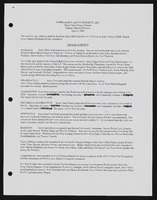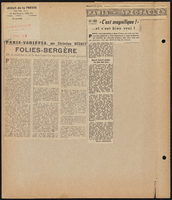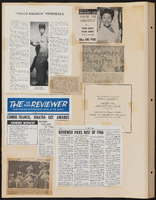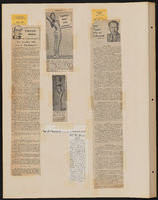Search the Special Collections and Archives Portal
Search Results

Yvanna Cancela oral history interview: transcript
Date
Archival Collection
Description
Oral history interview with Yvanna Cancela conducted by Monserrath Hernández and Barbara Tabach on February 27, 2020 for the Latinx Voices of Southern Nevada Oral History Project. Yvanna Cancela, Nevada State Senator, discusses her personal history growing up in Miami, Florida and her studies at Northwestern University. She talks of working for Senator Harry Reid's campaign in Las Vegas, which led to her organizing efforts for the Culinary Workers Union Local 226. Yvanna recalls being appointed to the Nevada State Senate in 2016 as the first female state senate majority. In addition to fulfilling her duties as the Co-Majority Whip, she worked on the Joe Biden campaign and is the Executive Director of the Citizenship Project. After this interview was conducted, Yvanna received her Juris Doctorate from the William S. Boyd School of Law at the University of Nevada, Las Vegas. Subjects discussed include: Miami, Florida; Nevada State Senate; The Citizenship Project.
Text

Marvelys Lopez Omaña oral history interview: transcript
Date
Archival Collection
Description
Oral history interview with Marvelys Lopez Omaña conducted by Monserrath Hernandez and Barbara Tabach on February 21, 2020 for the Latinx Voices of Southern Nevada Oral History Project. In this interview, Marvelys Lopez discusses her childhood and growing up in Caracas, Venezuela, where her father owned a toy store. She attended an all-girls Catholic School and from a young age knew that she wanted to be a doctor. In 1993, at the age of seventeen, she was able to study abroad in the United States for one year and moved to Las Vegas, Nevada. She returned to Venezuela to attend medical school and while attending medical school she met her husband, who was studying to be a registered nurse at the time. Lopez Omaña recalls volunteering as a firefighter in Venezuela, and discusses the political change that happened in Venezuela during her last years in medical school. She moved to back Las Vegas with her husband in 2003 and began working as a caregiver. She recounts Her first son's birth story, and describes how she became a Certified Professional Midwife.
Text

Nanyu Tomiyasu interview, March 11, 1978: transcript
Date
Archival Collection
Description
On March 11, 1978, Sosuke Miyazawa interviewed Nanyu Tomiyasu (b. May 28, 1918 in Las Vegas, Nevada) about his family’s farm and their legacy as one of the pioneering families of the city. Tomiyasu begins by talking about what brought his family to Las Vegas, the city’s abundant water reservoir and his father’s farm. In particular, Tomiyasu discusses his father’s experiments with farming as one of the city’s early farmers, the transition into nursery farming and Japanese gardens. Moreover, he discusses his siblings, the local schools, their great quality, the successful students the city produced and the growth of school populations. Tomiyasu describes the large Japanese population and the Union Pacific Railroad that many of them worked on. He ends by discussing the change in architecture within the city, such as where old buildings stood and what they are used for now, the first Episcopal Church and the old Mormon Fort.
Text

Transcript of interview with George Gilbert by Ruth Guidi, February 10, 1975
Date
Archival Collection
Description
On February 10, 1975, Ruth Guidi interviewed George Gilbert (born 1931 in Southgate, California) about his life in Nevada. George first talks about his education in Las Vegas and his family background. He also talks about times during World War II, the shopping facilities available to those in Las Vegas, the casinos that existed, the churches that were built, and the Helldorado parades. The two also discuss social clubs, politics, the atomic testing, environmental and social changes, the Mormon Fort, Hoover Dam, and the first movie theaters.
Text

Alpha Kappa Alpha Sorority, Theta Theta Omega Chapter meeting minutes (redacted)
Date
Archival Collection
Description
From the Alpha Kappa Alpha Sorority, Incorporated, Theta Theta Omega Chapter Records (MS-01014) -- Chapter records file.
Text

Eloiza B. Martinez oral history interview: transcript
Date
Archival Collection
Description
Oral history interview with Eloiza B. Martinez conducted by Maribel Estrada Calderón on October 10, 2018 for the Latinx Voices of Southern Nevada Oral History Project. Martinez discusses the career preparedness she took while working for Commercial Credit Corporation and studying with Mayor Oscar Goodman. She then describes her first impressions of Las Vegas, Nevada and about her community involvement. Martinez then discusses her work at Wells Fargo as loan officer and assistant vice president, and talks about discrimination in the workplace and in the neighborhood where she grew up.
Text

Herman Jimerson, Ruth Jimerson-Carter, and Leon Carter Jr. oral history interview: transcript
Date
Archival Collection
Description
Herman Jimerson and his younger sister Ruth Jimerson-Carter, along with her husband Leon Carter Jr., gathered on March 3, 2021, to talk about their memories and experiences growing up in West Las Vegas—the Westside.
OH-03746 contains additional interviews with the Carter family that are not transcribed in this document. Contact special.collections@unlv.edu for more information.
Text



